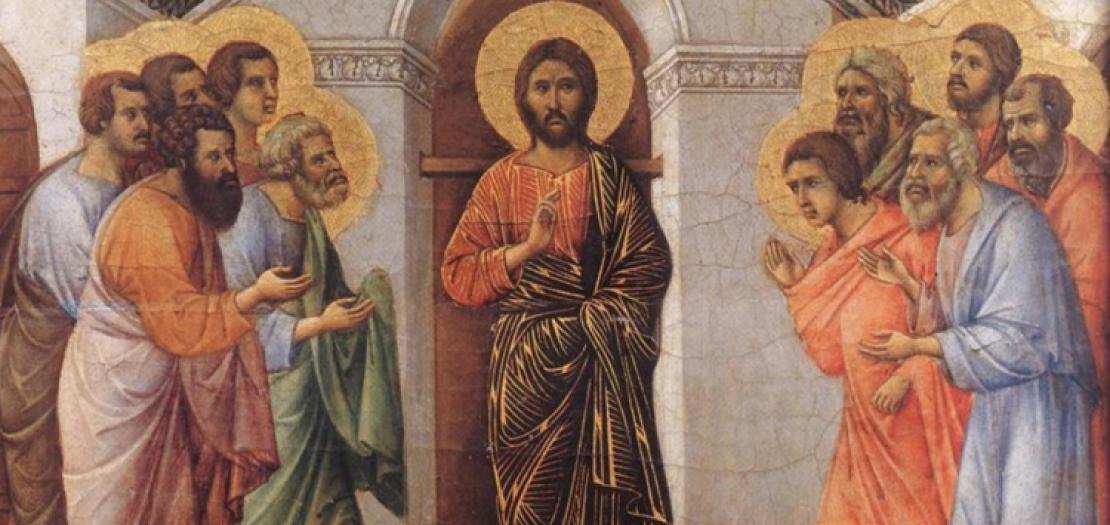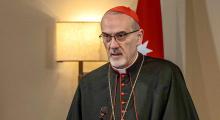Issued by the Catholic Center for Studies and Media - Jordan. Editor-in-chief Fr. Rif'at Bader - موقع أبونا abouna.org

Following is the text of meditation by Cardinal Pierbattista Pizzaballa, Latin Patriarch of Jerusalem: The 15th Sunday of ordinary time, dated July 14, 2024:
In today's Gospel passage, (Mark 6:7-13) we read about a significant transition in the story of Jesus and the disciples.
After Jesus has called his friends to accompany him and instructed them in the way of the Kingdom, he now sends them out, meaning he entrusts them with the Word of peace and reconciliation so that they may begin to bring it to all who longed to hear it, even without knowing it.
We first observe that at this point in the Gospel, the disciples have not come to a particular knowledge and understanding of their master: the last time Jesus addressed them, as we saw two Sundays ago, had been to rebuke them for their lack of faith. Yet, immediately thereafter, Jesus sends them in his name and entrusts them with the same power he had, that of healing people.
Jesus does not send them as people who know everything and have it all figured out, and this is no accident or mistake. The disciples are not people who know everything, and can proclaim because they have understood everything there was to understand.
On the contrary, they can proclaim because they are people who do not stop searching, who are also on a journey, who have not figured out all their doubts and problems. They are constantly called to receive a Word, before they can share it with others.
And that is why in sending them, Jesus especially emphasizes what they should not take with them. (Mark. 6:8-9)
This is the second observation: when you set out on a mission, you usually consider everything you can use to ensure the venture's success. Normally, the better equipped one is, the better the venture's success will be.
Here, it is the other way around: for the mission to succeed, it is necessary to leave without the necessities because the disciples do not have to bring anything, only the relationship they have experienced with their master.
Paradoxically, then, the disciples can leave because they allow themselves to be placed in a situation of need and insecurity; thus, they will not meet people with the presumption of those who already have everything and who already know everything but with the humility of those who offer themselves as fellow travelers, who share with everyone the same need for salvation and the same search for life.
Leaving as people who need to be welcomed is the most beautiful way of proclaiming the Gospel: it is not a matter of giving, of adding something to what others already are, but of provoking the good that the Father has given to every man, and that is hidden in the depths of everyone's life. To proclaim the Gospel is to unveil, to reveal, to bring to light this good, to create the opportunity for it to become a life lived.
The perspective, then, changes completely and asks the disciples to be very humble: They will not be the ones to save the world, but they can proclaim that salvation is already at work in every man.
Hence, the clothing of the missionaries, on which the Gospel dwells at length, is also symbolic: the staff and sandals (Mark 6:8-9) refer to the dress of the people coming out of Egypt (Exodus 12) to take the first steps on the path to freedom.
The invitation not to bring bread (Mark 6:8), while referring to an attitude of poverty and trust, is also an Easter symbol: in the desert, God himself had taken care to feed his people with manna. (Exodus 16) All this is to say that the disciples' mission will ultimately be to proclaim the Passover, to announce that the given life of the Lord Jesus opens for all a new path of salvation, in which every man is called to embark.
Mark's Gospel recounts this journey of the disciples, which will be marked, as we have already seen, by several crossings between the two shores of the Sea of Galilee: The Jewish shore and the pagan shore. (Mark 6:32,34,45,53; 8.10.13)
These crossings are crucial for the story line, but they also have great symbolic value: after all, the disciples' mission is to build bridges between different cultures and peoples, offering a good life free from evil and capable of making the fruitful seed of the Gospel flourish everywhere.
+Pierbattista







